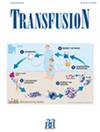The development and evanescence of red blood cell antibodies after transfusion: A multi‐institutional prospective study in Japan
IF 2.5
3区 医学
Q2 HEMATOLOGY
引用次数: 0
Abstract
BackgroundDespite several reports on red blood cell (RBC) alloimmunization, the actual prevalence and factors contributing to RBC alloimmunization in transfused patients remain poorly investigated. We examined the association between clinical factors and the development and evanescence of RBC antibodies after transfusion.Study Design and MethodsEach participating institution performed antibody screens before and after RBC transfusion. A survey including patient characteristics, results of antibody screen and identification, antibody screen methods, total amount of RBC transfused, and adverse reactions, was conducted.ResultsBetween October 2018 and March 2023, 1194 patients were registered at five institutions. Overall, 958 patients underwent at least one follow‐up RBC antibody screen after transfusion, revealing new antibody development in 44 (4.6%). Anti‐E was identified in 25 patients, anti‐Jk输血后红细胞抗体的发展和衰退:日本多机构前瞻性研究
背景尽管有多篇关于红细胞(RBC)同种免疫的报道,但对输血患者RBC同种免疫的实际发生率和诱发因素的调查仍然很少。我们研究了临床因素与输血后红细胞抗体的产生和消退之间的关系。研究设计和方法每个参与研究的机构都在输注红细胞前后进行了抗体筛查。调查内容包括患者特征、抗体筛查和鉴定结果、抗体筛查方法、输注 RBC 总量以及不良反应等。结果2018 年 10 月至 2023 年 3 月间,5 家机构共登记了 1194 例患者。总体而言,958 例患者在输血后接受了至少一次随访 RBC 抗体筛查,发现 44 例(4.6%)患者出现了新的抗体。输注的红细胞单位数与输血后抗体的产生有显著相关性(p <.001)。在输血后发现抗体(包括历史抗体)的 55 例患者中,有 18 例(33%)抗体消失;7 例抗 E,4 例抗 Jka,2 例抗 Lea。通过生理盐水和/或酶法发现的消失抗体多于持续抗体(p = .012)。应仔细进行抗体筛查,尤其是接受大量红细胞的患者。应确认之前的抗体筛查结果,以防止遗漏已消失的抗体,无论其是否与临床相关。
本文章由计算机程序翻译,如有差异,请以英文原文为准。
求助全文
约1分钟内获得全文
求助全文
来源期刊

Transfusion
医学-血液学
CiteScore
4.70
自引率
20.70%
发文量
426
审稿时长
1 months
期刊介绍:
TRANSFUSION is the foremost publication in the world for new information regarding transfusion medicine. Written by and for members of AABB and other health-care workers, TRANSFUSION reports on the latest technical advances, discusses opposing viewpoints regarding controversial issues, and presents key conference proceedings. In addition to blood banking and transfusion medicine topics, TRANSFUSION presents submissions concerning patient blood management, tissue transplantation and hematopoietic, cellular, and gene therapies.
 求助内容:
求助内容: 应助结果提醒方式:
应助结果提醒方式:


